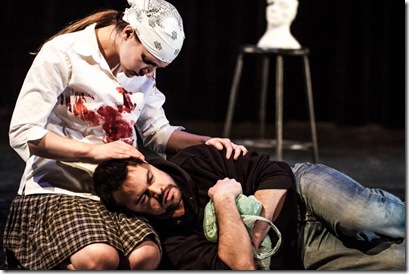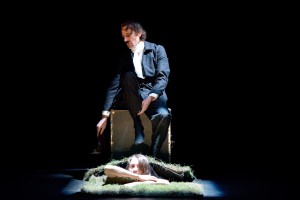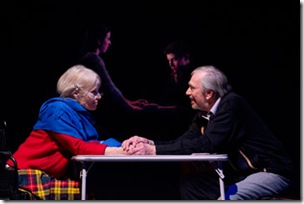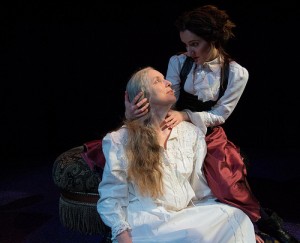 Half Life isn’t a play that provides easy answers. Indeed, it’s a play that distinctly provides very few answers to the large, often philosophical questions it poses. On the surface, it’s the tale of a burgeoning love between two nursing home residents. Scratch below the surface, though and you realize that writer John Mighton has created a work that transcends its immediate topic to deal with larger themes. It’s a play about ageing and the way our society treats its older members; it’s about memory and the bittersweet process of remembering and forgetting; and it’s about the way our own psyches and events impact our treatment of those around us. It’s a multi-layered play that requires an understanding of and empathy for not only its themes, but the human spirit. Director Jim McNabb shows he has both in his wonderfully sensitive, thoughtful adaptation for the Ottawa Little Theatre.
Half Life isn’t a play that provides easy answers. Indeed, it’s a play that distinctly provides very few answers to the large, often philosophical questions it poses. On the surface, it’s the tale of a burgeoning love between two nursing home residents. Scratch below the surface, though and you realize that writer John Mighton has created a work that transcends its immediate topic to deal with larger themes. It’s a play about ageing and the way our society treats its older members; it’s about memory and the bittersweet process of remembering and forgetting; and it’s about the way our own psyches and events impact our treatment of those around us. It’s a multi-layered play that requires an understanding of and empathy for not only its themes, but the human spirit. Director Jim McNabb shows he has both in his wonderfully sensitive, thoughtful adaptation for the Ottawa Little Theatre.
Half Life opens with two middle-aged divorcees meeting in the waiting room of a nursing home. Donald (played by Bryan Morris), a scientist specializing in neural research, is there to visit his frail mother, Clara (Marjory Bryce) a ritual he performs almost every day. Anna (Linda Webster) is there to sign in her father, Patrick (Dan Baran), who has of late become depressive and is an increasing danger to himself. When Clara and Patrick meet, the two are drawn to each other and both seem to remember a brief, but meaningful affair between them during the Second World War. The two become increasingly close and fall deliciously, madly in love. However, Patrick, worried about his increasingly frail mother and still reeling from the recent death of his father, is full of trepidation and refuses to consent to their marriage, which has a great effect on both involved parties. …
Read More Read More




 La Carte blanche donnée à Jean-Claude Duverger, vendredi soir dernier, par la direction de l’Atrium, a permis de révéler aux nombreux spectateurs de la salle Frantz Fanon, un beau récital « Des mots pour le dire ». Des mots justes, sans emphase, sans détour, ciselés à la pointure des histoires et des contes considérés comme sociaux, et initiatiques, que le comédien, poète conteur et acteur Jean Claude Duverger, transporte avec lui comme des porte-bonheurs depuis les premiers sourires de sa mère, dit-il.
La Carte blanche donnée à Jean-Claude Duverger, vendredi soir dernier, par la direction de l’Atrium, a permis de révéler aux nombreux spectateurs de la salle Frantz Fanon, un beau récital « Des mots pour le dire ». Des mots justes, sans emphase, sans détour, ciselés à la pointure des histoires et des contes considérés comme sociaux, et initiatiques, que le comédien, poète conteur et acteur Jean Claude Duverger, transporte avec lui comme des porte-bonheurs depuis les premiers sourires de sa mère, dit-il. 
